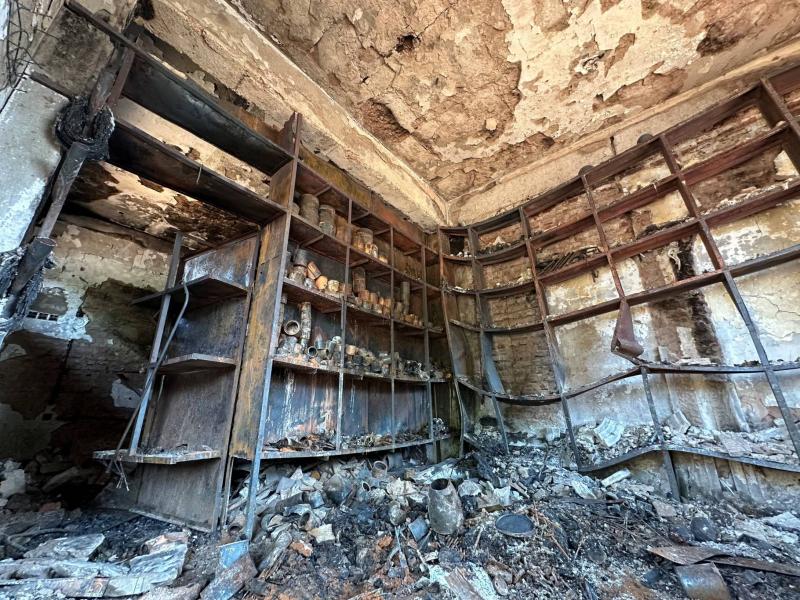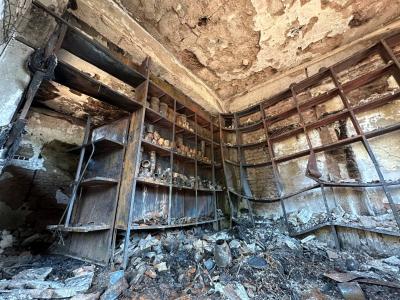Precious books have been burned in a large library in Sudan's capital, Khartoum, and the National Museum has been isolated for weeks due to fighting. Another museum in Darfur is now vulnerable to rainwater seepage after shells created holes in its roof. The ongoing conflict between the army and the Rapid Support Forces in Sudan since mid-April is negatively affecting the country’s rich cultural heritage, which includes the ancient Kingdom of Kush, known for controlling trade between South Africa and Egypt during the Pharaohs. Experts are racing against time to save what can be saved.
Last week, the "Heritage for Peace" organization published a report stating that at least 28 cultural and archaeological sites across the country have been targeted or have suffered collateral damage. This non-governmental organization connected with local researchers and archaeologists says that some sites, including numerous universities, are being used for military purposes.
In early June, the Rapid Support Forces released a video showing their troops inside the National Museum of Sudan in central Khartoum, which houses some of the world's oldest and most important mummies. Museum staff have not been able to access the site to assess the damage. Mahasin Youssef, an archaeologist at Bahri University, stated, "There is a real problem in obtaining complete information about what is happening, simply because most of these sites are within combat zones."
Sudan has two UNESCO World Heritage sites: Meroë Island, home to one of the largest ancient pyramid complexes in Africa, and Jebel Barkal, a sacred sandstone mountain near tombs, temples, and palaces along the Nile River. Both sites are in relatively calm areas.
Ismail Hamid Noor, a Sudanese researcher at the University of Birmingham, who documents endangered sites, said, "At the same time, the chances of looting and theft at the site increase." The Heritage for Peace organization reported that disturbances in the Darfur region have caused damage to at least four museums.
The organization stated that the roof of the museum in Nyala, Sudan's second-largest city and the capital of South Darfur, "sustained minor damage from shells, making its contents vulnerable to rain as the rainy season approaches." The museum contains pottery, jewelry, and tools that showcase the diversity of civilizations that once thrived in Darfur, where ethnic violence has escalated again since April. The museum is considered one of the main civil areas in Nyala.
The National Corporation for Antiquities and Museums has raised funds to pay the salaries of 100 guards and inspectors to return to their sites where it is safe, and has conducted fund transfers for emergency response training and measures to prevent illegal excavations, as well as educating school students in Darfur about the importance of cultural heritage. Ibrahim Musa, the director-general of the National Corporation for Antiquities and Museums of Sudan, stated that this is part of a campaign to raise public awareness about the importance of culture, without drawing attention to sites that might be targeted by armed factions seeking to promote their own understanding of Sudan’s history.
This follows the announcement by the National Corporation for Antiquities and Museums that fire destroyed at least 50 rare and valuable books or collections at Omdurman Islamic University, one of the three cities that make up greater Khartoum. Photos shared on social media showed piles of charred books and manuscripts. The International Center for the Study of Preservation and Restoration of Cultural Property, along with the National Corporation for Antiquities and Museums of Sudan, is working on strategies to preserve cultural heritage during the war, including the possibility of evacuating artifacts.
Aparna Tandon, an official at the International Center for the Study of Preservation and Restoration of Cultural Property, said, "While there is a great deal of awareness regarding cultural heritage and the need to protect it in times of crisis, one of the biggest challenges we face is that culture is still not integrated into the language of humanitarian aid."
Digital humanities expert Marilene Dijan from the UK, along with local researchers, has initiated a project to create a digital archive of Sudan's cultural history after rebels in Mali burned some ancient manuscripts in Timbuktu. By the time the war began, they had digitized up to 150,000 images of materials ranging from 4000 BC to the 2019 uprising that ousted Omar al-Bashir. Dijan added that millions of materials remain undigitized and at risk of being lost forever. She remarked, "There are radio tapes from the 1940s in Sudan Television. There are still many documentaries in the cinema archive, manuscripts, books, photos, and artifacts."




